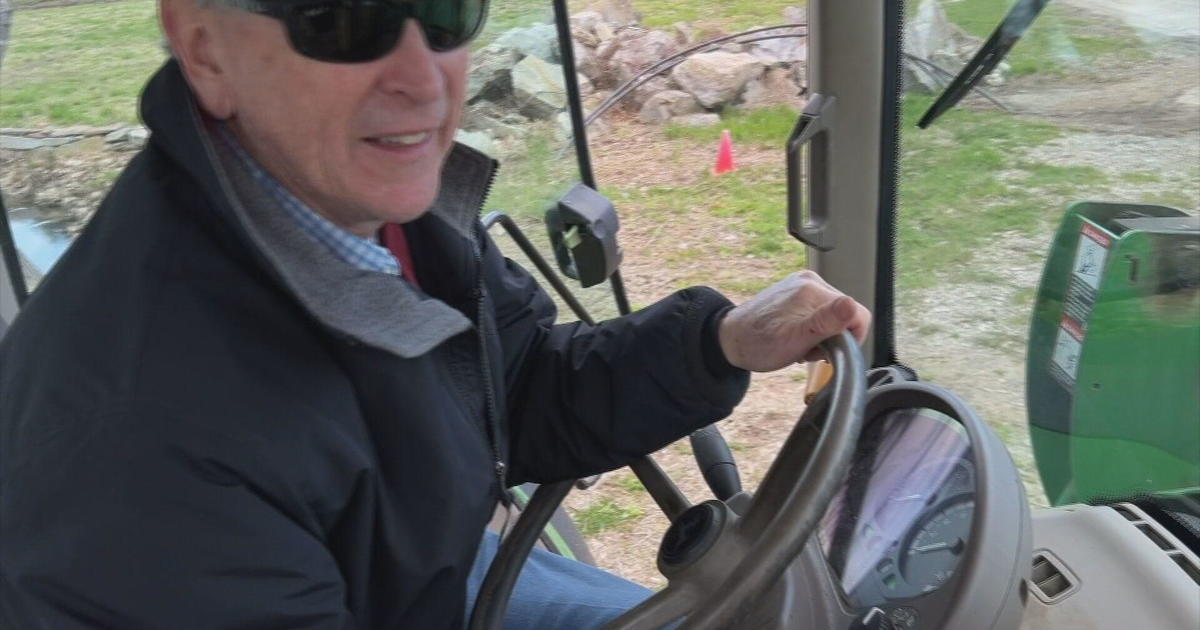Renowned Mass. Environmentalist Not Ready To Retire At Age 85
GROTON, Mass. (AP) — Standing in the 5-acre meadow expanding from her house toward the forest along the Nashua River, Marion Stoddart can easily recall the putrid odor that once signaled the direction of the waterway.
Toxic discharge from area paper mills colored the water red, yellow and blue during the 1960s, and snarled it under thick crusts of sludge. The state deemed the feces-ridden river unfit to even transport waste.
"Birds and animals could walk across the top of it without getting their feet wet," Stoddart said.
Stoddart wasn't going to let it be. The granddaughter of homesteaders raised on a farm in Reno, Nev., would begin her relentless campaign toward the river restoration, contacting one community leader and water resources organization at a time to win their support.
She would sit in Fitchburg City Hall until then-Mayor Bill Flynn could no longer pretend not to be there, eventually turning him into an environmental crusader.
After successfully pushing for the enactment of state Clean Waters Act and the federal Water Pollution Control Act, though, the legendary environmentalist says her decades-long effort to protect rivers is far from over. With 45 percent of the shorelines along the 56-mile main stem of the Nashua River now preserved, Stoddart wants to protect the entire riverbank, including those of tributaries such as Nissitissit and Squannacook.
And she intends to work toward the goal the way she always has.
To make a difference in the world, Stoddart said, one doesn't need to be "super intelligent or super anything."
"You just create a vision of what you want and be persistent," she said.
Stoddart, who is synonymous with the river-restoration movement of the 1960s, turned 85 on May 26. In celebration, the Nashua River Watershed Association, which she helped found in 1969, has created the Greenway Fund in her name to help continue the river protection Stoddart spearheaded so many years ago.
Those who have known Stoddart said she is a tenacious activist who won't take no for an answer. But her humility would also leave a lasting impression.
"She is really a lot like all of us," said Susan Edwards, the Pepperell filmmaker who created the documentary, "Marion Stoddart: The Work of 1,000."
"She cares so much about people and cares so much about the planet," Edwards said. "She honestly feels individual efforts add up to so much more."
Stoddart moved from Sudbury to Groton in 1962. People around her thought cleaning up the Nashua River, which "National Geographic" named one of the most polluted waterways in the nation, was impossible. Her children, then in third and fifth grade, were told their mother was crazy.
But Stoddart firmly believed that social change can start with one person stepping toward it. An active member of the League of Women Voters, Stoddart contacted the chairs of the league's water resource study committees in all communities along the river. The network of support soon expanded to include the national leaders of the league, like-minded activists elsewhere and community leaders.
When federal agents came to Fitchburg to hear how clean the residents wanted the river to be in the early 1970s, Stoddart urged people not to settle, rounding up their support to have the goal set to make it suitable for drinking, swimming and boating.
"People really came together. They became believers," Stoddart said.
Flynn said the Nashua River started to transform once new wastewater plants built under the new state law came online.
"She has a way of getting people to work together to accomplish their common objectives," said Flynn, who has worked with Stoddart to restore the river since the day they met.
"She keeps people oriented on what is important," said Bob Pine, a Groton resident who has served on municipal and citizens committees with Stoddart, including 20 years on the board of the Groton Land Foundation. Pine said Stoddart may be an idealist who cares about what's right, but also is pragmatic about how to carry out her mission, Pine said.
Fitchburg Mayor Lisa Wong called Stoddart an "environmental hero" who opened her eyes to the connections among politics, the environment and human lives, inspiring her to run for mayor.
"She is not your typical activist. She is incredibly humble, down-to-earth," Wong said.
Stoddart said her work ethic stems from working on her family's alfalfa farm and helping her father run his general store and a post office as a teenager. She studied anthropology and sociology at Occidental College in Los Angeles before obtaining teaching credentials at the University of California at Berkeley and teaching youths in conservation camps. Stoddart and her husband, Hugh, a physicist, have three grown children and five grandchildren.
Today, Stoddart remains engaged in river cleanup activities and groups, including the town Greenway Committee. She travels across the country to talk about her life as an activist at screenings of "Marion Stoddart: The Work of 1,000."
"She is astoundingly energetic. She is constantly alert to opportunities to make a difference," said NRWA Executive Director Elizabeth Ainsley Campbell.
Stoddart and her husband recently restricted development on their 5-acre backyard off Long Hill Road through the Groton Conservation Trust. Stoddart said she wants to help people understand how preserved shorelines filter water, protecting the integrity of the waterway.
Copyright 2013 The Associated Press.



